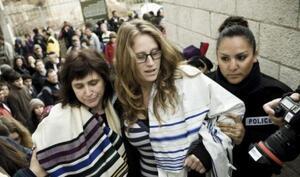A Civil Sinai
When I became a Woman of the Wall, I became more fully Jewish.
I had been a rabbi for almost 20 years the day I was detained, with nine other women – including my seventeen-year-old daughter – by police for wearing a tallis and praying out loud at the kotel. We were singing the psalms of hallel when a young police officer waved for me to follow her out of the women’s section. I shook my head. She approached me, her hand outstretched. I reached for my daughter who is named for the prayers we sang – Hallel – and together we sat down. The police officer squatted in front of me and asked me to come with her.
I shook my head. I’m sorry, I said to her. I don’t want to cause you trouble. But I’m not going. I looked directly at her. She must have been a new officer – fresh from the army. Dark hair pulled into a sleek pony tail. Black eye liner under her brown almond eyes. Serious countenance under a layer of foundation, lipstick and blush. What was the kotel to her? What in our tradition did she own, create anew, love? Or was religion, like our country’s army and police forces, designed by a few who commanded our actions, our rituals and our dress code?
Arrest it would be. That was not a frightening thing. Israel is not Yemen or Russia or China. It would be a long day, some hassle, but no real personal risk.
The existential threat was to Sinai. And to democracy. And the inherent commonality in both.
We all stood at Sinai, we all saw the fire and heard the thunder. We all shook as God’s words pierced us, a spiritual alchemy that transformed individuals – varied, colorful, damaged, hopeful, open-hearted, narrow-minded, good, cruel, passionate, listless – into a community in covenant with the Holy Blessed One. Monotheism means that nothing else is “mono”. Only God is whole.
Some fear colorful variations – what if we step over the borders of God’s will?
But I fear narrowness. I fear the few defining the many. Because that is idolatry – seeing a fraction as the whole. I had always felt that the centuries of missing women’s voices had created a skewed Judaism – like a tree that had been deprived the right balance of sustenance.
In Israel, public and private Jewish practices were more and more the jurisdiction of Hareidi Jews. Mitzvot are seen by the ultra-Orthodox few as ends in themselves – a kosher cheese barekas had to have a certain shape versus a potato berakas to maintain a perfect separation of milk and meat. This obsession in a country with rising poverty and suffering refugees?
I believe mitzvot are building blocks for a just and compassionate society, one in in which the prophets could rejoice. And the Kotel just might be the cornerstone in that transformation. Judaism is at stake for women and men. For all our children. For the Jewish future. With WoW, I realized that my feminist, progressive fight was for the deepest purposes of our nation, for when a narrow, idolatrous view of God and covenant are codified in civil law, democracy ceases. And so does Sinai.
The prayer service ended. Women hugged each other, Hodesh Tov, Hodesh Tov. The police receded. I surveyed the near distance for the young women officer. I wondered if our songs of praise pierced her heart. If she remembered Sinai. We filed out of the women’s section and were met by police. The eyes-traced-with-kohl met mine as her hand took hold of my arm. Hallel, my Hallel, and I were herded into the police van along with eight other women – two of whom were American rabbis just come from Ukraine, where they had prayed freely and publicly – and off we went to the station for questioning. Do you know that your prayer is offensive to others? Do you know that it is illegal to wear a tallit? Do you know that singing loudly in the women’s section is not allowed?
Do we want to live in a country where bigoted religious laws are enforced by the young Jewish woman who is robbed of the very gift she is obligated to “protect”?
From The Sacred Calling: Forty Years of Women in the Rabbinate, forthcoming from CCAR Press. © 2014 by CCAR Press. Used with permission.







